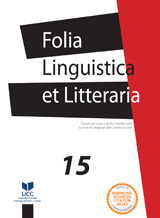The Translation of Multilingual Literature in a Migrant World. The Case of Junot Diaz
The Translation of Multilingual Literature in a Migrant World. The Case of Junot Diaz
Author(s): Philippe Humblé, Lara de WilderSubject(s): Theory of Literature
Published by: Filološki fakultet, Nikšić
Keywords: Junot Díaz; migration; literary translation; Spanglish; identity
Summary/Abstract: Due to emigration waves in recent decades, multilingual literature has become increasingly common (Knauth 2007). It is therefore natural that there should be an increase in the research on this kind of literature (Grutman 2009). Countries like the United States have been an economic attraction pole for many years and have had a Latino literature for half a century. Being one of the most representative migrant groups in the United States the Latino community, whose migration tradition and miscegenation goes back so far in time, gave rise to a language of its own: Spanglish. Over the last fifty years a group of writers has been making use of this "language," emblematizing some sort of "Latino identity." Their literature is multilingual in that it mixes two languages, even in a same sentence (Stavans 2013). Are these expressions of "group belonging" being preserved when they are translated? Can we discover some sort of "identity" when we collect the expressions of Spanglish in literature and does this identity vanish when it is translated? In this article we analyse the translations into Spanish of the Dominican migrant writer Junot Diaz. We try to answer the question if the Spanglish component in his literature is essential to Junot Diaz’s art and is it an essential expression of the writer’s own identity? The answer to this question might not be straightforward.
Journal: Folia Linguistica et Litteraria
- Issue Year: 2016
- Issue No: 15
- Page Range: 157-169
- Page Count: 13
- Language: English

